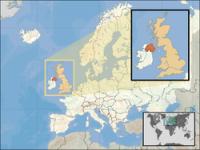|
|
|
Northern Ireland ( , Ulster Scots: Norlin Airlann) is one of the four countries of the United Kingdom. Situated in the north-east of the island of Ireland, it shares a border with the Republic of Ireland to the south and west. At the time of the 2001 UK Census, its population was 1,685,000, constituting about 30% of the island's total population and about 3% of the population of the United Kingdom. Northern Ireland consists of six of the nine counties of the Irish province of Ulster. It was created as a distinct division of the United Kingdom on 3 May 1921 under the Government of Ireland Act 1920, though its constitutional roots lie in the 1800 Act of Union between Great Britain and Ireland. For over 50 years it had its own devolved government and parliament. These institutions were suspended in 1972 and abolished in 1973. Repeated attempts to restore self-government finally resulted in the establishment of the present-day Northern Ireland Executive and Northern Ireland Assembly. The Assembly operates on consociational democracy principles requiring cross-community support. Northern Ireland was for many years the site of a violent and bitter ethno-political conflict-the Troubles-which was caused by divisions between nationalists, who are predominantly Roman Catholic, and unionists, who are predominantly Protestant. Unionists want Northern Ireland to remain as a part of the United Kingdom, while nationalists wish for it to be politically reunited with the rest of Ireland, independent of British rule. Since the signing of the "Good Friday Agreement" in 1998, most of the paramilitary groups involved in the Troubles have ceased their armed campaigns. Due to its unique history, the issue of the symbolism, name and description of Northern Ireland is complex, and similarly the issue of citizenship and identity. In general, Unionists consider themselves British and Nationalists see themselves as Irish, though these identities are not necessarily mutually exclusive. |




 RSS
RSS